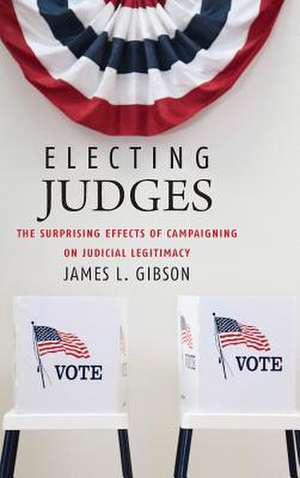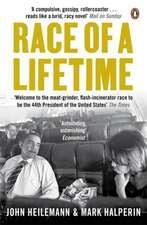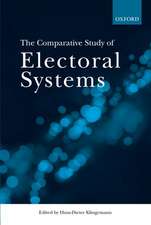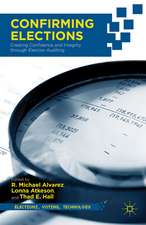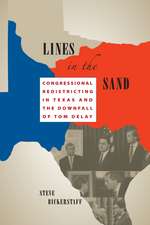Electing Judges: The Surprising Effects of Campaigning on Judicial Legitimacy: Chicago Studies in American Politics
Autor James L. Gibsonen Limba Engleză Hardback – 15 oct 2012
In Electing Judges, leading judicial politics scholar James L. Gibson responds tothe growing chorus of critics who fear that the politics of running for office undermine judicial independence and even the rule of law. While many people have opinions on the topic, few have supported them with actual empirical evidence. Gibson rectifies this situation, offering the most systematic and comprehensive study to date of the impact of campaigns on public perceptions of fairness, impartiality, and the legitimacy of elected state courts—and his findings are both counterintuitive and controversial.
Gibson finds that ordinary Americans do not conclude from campaign promises that judges are incapable of making impartial decisions. Instead, he shows, they understand the process of deciding cases to be an exercise in policy making, rather than of simply applying laws to individual cases—and consequently think it’s important for candidates to reveal where they stand on important issues. Negative advertising also turns out to have a limited effect on perceptions of judicial legitimacy, though the same cannot be said for widely hated campaign contributions.
Taking both the good and bad into consideration, Gibson argues persuasively that elections are ultimately beneficial in boosting the institutional legitimacy of courts, despite the slight negative effects of some campaign activities. Electing Judges will initiate a lively debate inside both the halls of justice and the academy.
Din seria Chicago Studies in American Politics
-
 Preț: 184.18 lei
Preț: 184.18 lei -
 Preț: 200.45 lei
Preț: 200.45 lei -
 Preț: 200.74 lei
Preț: 200.74 lei -
 Preț: 184.22 lei
Preț: 184.22 lei -
 Preț: 139.51 lei
Preț: 139.51 lei -
 Preț: 199.68 lei
Preț: 199.68 lei -
 Preț: 181.43 lei
Preț: 181.43 lei -
 Preț: 184.55 lei
Preț: 184.55 lei -
 Preț: 200.74 lei
Preț: 200.74 lei -
 Preț: 238.41 lei
Preț: 238.41 lei -
 Preț: 214.42 lei
Preț: 214.42 lei -
 Preț: 238.12 lei
Preț: 238.12 lei -
 Preț: 200.53 lei
Preț: 200.53 lei -
 Preț: 184.88 lei
Preț: 184.88 lei -
 Preț: 186.28 lei
Preț: 186.28 lei -
 Preț: 187.09 lei
Preț: 187.09 lei -
 Preț: 185.51 lei
Preț: 185.51 lei -
 Preț: 154.99 lei
Preț: 154.99 lei -
 Preț: 184.84 lei
Preț: 184.84 lei -
 Preț: 222.81 lei
Preț: 222.81 lei -
 Preț: 264.38 lei
Preț: 264.38 lei -
 Preț: 234.24 lei
Preț: 234.24 lei -
 Preț: 245.91 lei
Preț: 245.91 lei -
 Preț: 219.11 lei
Preț: 219.11 lei -
 Preț: 244.51 lei
Preț: 244.51 lei -
 Preț: 262.29 lei
Preț: 262.29 lei - 23%
 Preț: 676.12 lei
Preț: 676.12 lei -
 Preț: 142.44 lei
Preț: 142.44 lei - 23%
 Preț: 569.99 lei
Preț: 569.99 lei - 23%
 Preț: 579.86 lei
Preț: 579.86 lei - 23%
 Preț: 580.45 lei
Preț: 580.45 lei -
 Preț: 248.79 lei
Preț: 248.79 lei -
 Preț: 493.87 lei
Preț: 493.87 lei -
 Preț: 266.29 lei
Preț: 266.29 lei -
 Preț: 137.72 lei
Preț: 137.72 lei -
 Preț: 230.71 lei
Preț: 230.71 lei -
 Preț: 263.71 lei
Preț: 263.71 lei -
 Preț: 258.74 lei
Preț: 258.74 lei -
 Preț: 257.00 lei
Preț: 257.00 lei -
 Preț: 265.76 lei
Preț: 265.76 lei -
 Preț: 233.98 lei
Preț: 233.98 lei
Preț: 575.67 lei
Preț vechi: 747.63 lei
-23% Nou
Puncte Express: 864
Preț estimativ în valută:
110.17€ • 114.59$ • 90.95£
110.17€ • 114.59$ • 90.95£
Carte tipărită la comandă
Livrare economică 14-28 aprilie
Preluare comenzi: 021 569.72.76
Specificații
ISBN-13: 9780226291079
ISBN-10: 0226291073
Pagini: 240
Ilustrații: 1 halftone, 15 line drawings, 20 tables
Dimensiuni: 152 x 229 x 33 mm
Greutate: 0.45 kg
Editura: University of Chicago Press
Colecția University of Chicago Press
Seria Chicago Studies in American Politics
ISBN-10: 0226291073
Pagini: 240
Ilustrații: 1 halftone, 15 line drawings, 20 tables
Dimensiuni: 152 x 229 x 33 mm
Greutate: 0.45 kg
Editura: University of Chicago Press
Colecția University of Chicago Press
Seria Chicago Studies in American Politics
Notă biografică
James L. Gibson is the Sidney W. Souers Professor of Government at Washington University in St. Louis and Professor Extraordinaire in Political Science at Stellenbosch University in South Africa. He is the author or coauthor of eight books, including Citizens, Courts, and Confirmations, and is the recipient of an APSA Lifetime Achievement Award.
Cuprins
Preface and Acknowledgments
One The “New Style” Judicial Elections in the American States
Two Republican Party of Minnesota v. White and Perceptions of Judicial Impartiality
Three Can Campaign Activity Cross the Line?
Four Diffuse Support for a State Supreme Court: Judicial Legitimacy in Kentucky
Five Expectancy Theory and Judicial Legitimacy
Six Judges, Elections, and the American Mass Public: The Effects of Judicial Campaigns on the Legitimacy of Courts
Seven Judicial Campaigns, Elections for Judges, and Court Legitimacy:
Do Judicial Elections Really Stink?
Appendix A Legal Developments Post-White
Appendix B The Surveys
Appendix C Experimental Vignettes
Appendix D Question Wording
Appendix E The Distributions of Key Analytical Variables
Appendix F Interactive Analysis
Appendix G Measuring Support for Democratic Institutions and Processes
Appendix H Question Wording
Appendix I Adding Control Variables
Notes
References
Index
Recenzii
"An important work full of insights and surprises—and one that has significant policy implications."
"Judicial independence is one of our most sacred institutional values, and the means of securing it in state courts has been a source of continuing debate. Gibson’s writing is superb, distilling arcane analytical and theoretical issues to show that, contrary to widely held views, people are more willing to accept the decisions of judges when they have the power to reject those who perform poorly, and thus elections build rather than corrode legitimacy. Electing Judges is a monumental achievement."
"Electing Judges represents a perfect nexus between theoretically driven political science scholarship and real-world politics. Using evidence from survey experiments while remaining agnostic in the normative debate, Gibson disproves the conventional wisdom about how Americans perceive judges, courts, and the judicial selection process. This superbly crafted work should be the cornerstone of any serious discussion of judicial power and institutional reform."
James L. Gibson is an intellectual giant in the field of judicial politics, and Electing Judges may be his most important contribution to date. This is a first-rate piece of scholarship that speaks directly to the central arguments in a highly contentious ongoing debate. For all interested in the judicial selection process, Gibson’s evidence is powerful and simply cannot be ignored.
“Although there have been many doomsday scenarios put forth by those opposed to judicial elections, there is virtually no empirical evidence—positive or negative—regarding the effects of politicized judicial campaigns on judicial legitimacy. Enter James L. Gibson’s book, Electing Judges. Using both experimental vignettes and panel surveys, Gibson has written one of the most important books on the effects of judicial elections. Indeed, it may be the most important book on the topic since Dubois’s From Ballot to Bench.”
“This careful study dispels a number of myths about popular attitudes toward the courts and is a major contribution to the debate over state judicial selection. A number of states are currently reconsidering how they select their judges. Gibson’s careful study can—and should–make a significant contribution to those deliberations.”
"Simply put, this book provides an extremely important theoretical and empirical contribution to the study of judicial elections and legitimacy. It also contains numerous normative, policy, and institutional implications relevant to how we select our judges in the US. Gibson does a superb job of addressing claims by opponents of judicial elections in an objective, balanced fashion and the variety of research designs and data analyses only boosts the validity of his conclusions. Gibson also does a masterful job of elaborating on the substantive implications of his findings. On the whole, the book is extremely well written, well executed, and well argued."
“Social science at its best combines theoretical rigor with methodological precision to provide answers to pressing real-world questions, and that is what Gibson delivers in this book. In Electing Judges, Gibson has delivered a path-breaking and provocative book that serves as a reasoned empirical response to a good deal of conventional wisdom. It promises to be of interest to those who study law and courts, the effect of campaigns on the views and opinions of citizens, the underpinnings of judicial legitimacy, or state politics.”
“Electing Judges provides valuable insight into our understanding of state supreme courts and the nexus between campaigning and perceptions of legitimacy of state supreme courts. The theoretical development and sophisticated empirical analyses are creative and carefully executed. This is a book that will be of value not only to state court scholars but to those with an interest in courts more generally, as well as to those who study public opinion, elections, and the connections between public attitudes and institutional legitimacy.”
